gaudi, blake, illuminated manuscripts, yeats, jung, klimt, varo, otto dix, khalo, munch, fairey
gaudi!
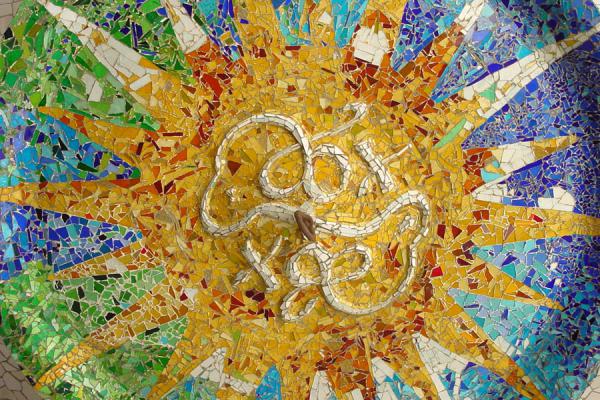

so now i have to explain my art party in words:
william blake
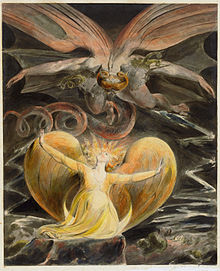
the book of kells



arthur rackham
 yeats
yeats
william butler yeats
auras
expressionism
stained glass
chagall
christian iconography
saints
 yeats
yeats
gustave dore

odilon redon

hannah hoch collage
dada

surrealism
carrington
fancy
victorian nursury rhyme illustrated book i udsed to pour over as a child
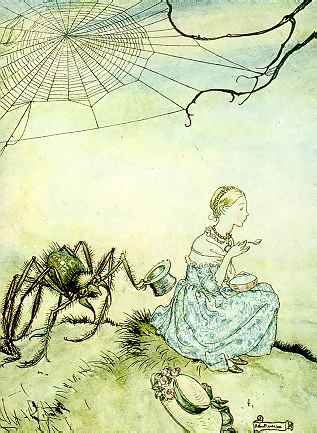

lewis carroll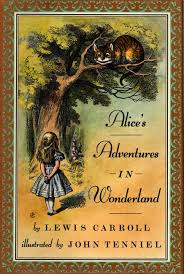
or the sublime camille rose garcia

fantasy.
marie antoinette---the sophia coppolla film.
lots of cake everywhere.

nature v. glass, civilization
chagall, cancerian


metals
symbology
carl jung's the red book




viktor and rolf as sculptors
gareth pugh
hundertwasser
mandala
stravinsky rite of spring



gold
moods of norway

gustave klimt, lots and lots and lots of gustave klimt
wiener werkstaette
art nouveau
art deco
bauhaus
hundertwasser

simplicity
simpler times
ireland
high tea

the collage books of bianca kawecki, my leonine friend who inspired me on many things regarding art, fashion, collage, buddhism, feng shui, yoga, travel, opera
and how to be a better leo!
i found a gobs of free colored pencils at the supply recycle exchange on campus. i was delivering my scary economics paper that momentarily made me feel like nicholas kristof or something.
going for quantity over quality.
here is a cultural musing based on a preposterous Q about arts funding:
4. a) An empirical study shows that “wicked men have no songs”. Could that be an argument to subsidize the “consumption” of music?
If wicked men have no songs, it would be necessary to contract that out, in a sense outsourcing the creative role. In the sense that the passive uncreative class purchases the music, and that they in that sense have a music deficit or deficiency, it would then be paramount for them to find it elsewhere. As music is a function of creative state or the artist as shaman, or priest, or avatar, or intermediary with the divine----the wicked would need to have the spiritual assistance to reach these liminal states.
Swedish fiscal policy holds high accord for the production of music and the arts as a value commodity with exportable value. Very clearly and in plain language the state claims that the arts receive sizable state subsidy for that reason. As even rock and roll music is deemed worth state investment, artists then become the beneficiary of state sponsorship, and the international music consumer also reaps the rewards of a heavily financed arts programme.
The consumption of music treads not so lightly on the subject of political control and the swaying of ideology, as demonstrated as the USA sought to control the “communism” rooted out through the vigilant sequestration and blacklisting of unamerican activities in film and music and art. A deliberate state infiltration of the visual arts allegedly sought to root out communism even in the visual arts, discouraging the pictoral proletariat realism as so vibrantly mastered by artists Diego Rivera. State art policy favored abstraction and was created through the era of the red scare policy geared against proletariat art forms that might inspire revolt or ideology change.
Internationally artists suffered the backlash of state ideology repression. Shostakovitch wrote in the face of steady state critique and repression and was heavily criticized for subversion or submerged satirical state critique, an amazing feat for one operating in mere tonality. If tonality might convey revolution, rebellion, or pessimism about state policy, so then the state might decide to sponsor art forms which enhance and support regime.
Another notable composer whose tonal patterns and progressive attitudes towards composition and tone was Hindemith who was able to remain in Germany for part of the Reich, put eventually fled for the USA where his creativity could better flourish. The Goebbelsian control and restriction of information economies was essential to maintaining a masterful control over the mental state of the populace. The organization of “degenerate” art --enartete kunst--shows to highlight the purported moral corruption of art deemed unreichlich, further affirmed the state’s power to enact social control through arts subsidy and or restriction. And so with burnt books.
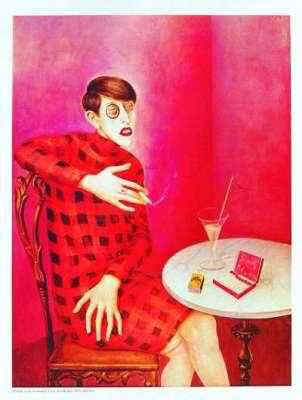 otto dix
otto dix
The courage of satirical sentiment of new objectivity which mocked the burgerlich new industrialists 1920’s and 1930’s might perish under censure or control!
In the avenue of political visual arts permissible arts gave eloquence to the ideals of empire: loyalty, nationalism, sacrifice for the good of the ideal. As Maoist poster design is now the subject of satire, or the study of international propaganda design a subject of concern as the various state-sponsored ad campaigns styled the image or branding of an identity, so it becomes clear that state-funded arts campaigns have a heavy dose of ideology encapsulated in the permissible fundable arts.
if Brechtian theater were enabled to spur the transformation of society into an artistic vision of a political necessity, state sponsorship would have far wider benefits than numerical transactions as denoted by ticket or record sales. The transmissions would serve a larger sphere.
The French film maker Godard spoke of the excessive state control ever present in restricting cinema industry. He could not film on the metro, and faced numerous restrictions. As we are now catapulted into the era of omnipresent media, with massive waves of multimedia participatory surveillance, agenda has become even more complex to manage when it comes to arts funding---or arts as the conduit of ideology.
As messages lie under contradictory messages and might lie encoded and indetectible from censors, films such as “Moscow does not Believe in Tears” might both critique regime and support regime. If it were the Anarchist’s cookbook, or Abbie Hoffman’s Steal This Book, or the grandeur of shoplifting as exalted in Fassbinder’s Love is Colder than Death, critique or endorsement of economic systems might take on many forms, even while maintaining generous governmental arts subsidy.
b) Several countries subsidize their opera houses? In which cases would that be economically justified?
Arts funding has been slashed globally in the last five years of decline. Whether dating to the Medici family history of patronage, or modern day grant programs, or the USA’s National Endownment for the Arts, art cannot survive without financial backing. Venture capital for the arts can be privatized, or semi-privatized, but when VC under state sponsorship occurs, it undergoes rigorous critique, especially in the face of imminencies less frivolous than entertainment, or more immanent: propaganda control. Currently the Los Angeles opera runs the risk of bankruptcy with their production of the Ring Cycle, in a time when the budget is so strained and homelessness is at an all time high. The infrastructure is a point of collapse and the citizens lack health care. Schools and hospitals are victimized by the budget crisis, yet the opera budget has remained somewhat intact. As art budgets suffer attack nationally, the long term viability of ignoring basic infrastructure while supporting what is now considered by some to be an elite art form for the upper classes holds less and less allure. In a more classical context the opera houses might operate as the purveyor of political propaganda, and in that sense would hold such a valuable role in society as to be entirely defensible. If the transmission of valuable state ideology were transmissible to many classes, opera as a method of political control would be entirely defensible. Inasmuch as the people generally are more submissive and happy and exploitable when entertained, opera houses function as the critical panem et circenses, the “bread and circuses” necessary to keep citizens, preoccupied, entertained, and amused and less interested in regime change or critique. But this was more true, centuries ago, as more true now would be video games, or even still the television, and then also the Youtube culture. And quite fascinatingly a press release in the last weeks has announced that Youtube will be granting arts grants to inspired heretofore pro bono homespun film makers. In that sense and egalitarian social policy subsidizing the opera as an entertainment venue might keep the populace narcotized and defer any intervention into policy. In that sense the investment by the state would be entirely worthwhile.

otto dix
it obviously needed the shepard fairy visual aid:

so di the pluto prosepoem illustrated book:
more inspiration:
remedios varo's supernaturalism


hannah hoch

frieda khalo's works about inextricable psychic ties


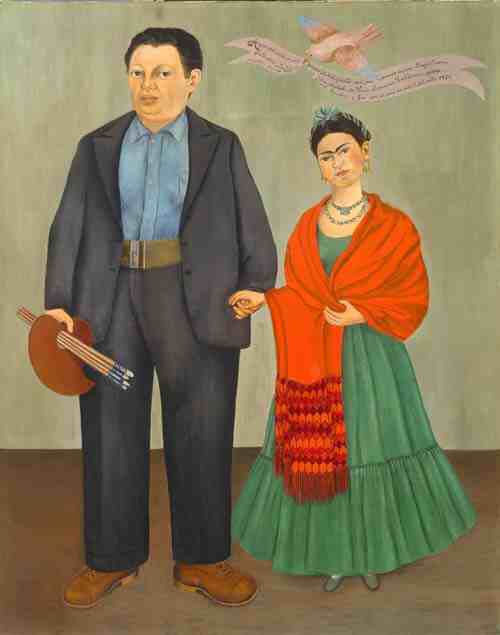
and ever present the melancholy of munch and the swirls of hair
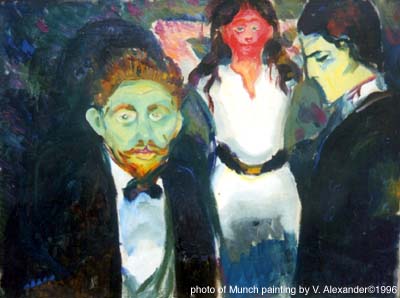

Separation, Edvard Munch
Oil on canvas, 1900

Separation II (Breaking away / Parting), Edvard Munch
Lithograph, 1896


anime too!
louise bourgeois
(warhol, leo)
all diarists.
comic books.
beck.com
FREE CULTURE:
all this random free stuff in portland. not that i'm a materialist.
mirror
lamp
antique dresser
corn muffins
rice tofu
colored pencils
flash drives
bag
basket
coffee mugs
sunglasses
rasberries
sleeping bags
lonely planet australia tour book
antique book on EU history.
kurt weil and leyla biography yay i deserve it after my ridiculoux faux econ polemic!
drei groschen oper vieleicht!
blondifying shampoo samples
office supllies
oh and apple products on rebate hahahaha!
rose petals
lifetime supply of yerba mate
wild carrot skin product stuff at whole foods so pretty!
streetcar and train rides! free no joke!!!!!
music on streetcorners: violins everywhere!
its like socialist swag
free-est free people i know! everything is free, especially blackberries!
internet
free culture
copyleft.
my nihilism is having a hard time staying grumpy, but clearly portland is not the louvre or trafalgar square, which is both good and bad, i guess. neither is it sonically rich enough without pluto.
but the choking breaths of green air wake me up in the a.m.
my brain is confused by cleaner air and water
nick said red and purple might be his colors. so then there was this. which i really liked trying to put lots of colors that don't belong in odd places, green skin, blue hair, as it is the stuff that isn't there that is worth painting (to paraphrase picasso) the auras the feelings that which cannot be photographed


so now i have to explain my art party in words:
william blake

Blake's The Great Red Dragon and the Woman Clothed with Sun (1805) is one of a series of illustrations of Revelation 12.
the book of kells



arthur rackham
 yeats
yeatswilliam butler yeats
auras
expressionism
stained glass
chagall
christian iconography
saints
 yeats
yeatsgustave dore

odilon redon

hannah hoch collage
dada

surrealism
carrington
fancy
victorian nursury rhyme illustrated book i udsed to pour over as a child


lewis carroll

or the sublime camille rose garcia

fantasy.
marie antoinette---the sophia coppolla film.
lots of cake everywhere.

chagall, cancerian


metals
symbology
carl jung's the red book




viktor and rolf as sculptors
gareth pugh
hundertwasser
mandala
stravinsky rite of spring



gold
moods of norway

gustave klimt, lots and lots and lots of gustave klimt
wiener werkstaette
art nouveau
art deco
bauhaus
hundertwasser

simplicity
simpler times
ireland
high tea

the collage books of bianca kawecki, my leonine friend who inspired me on many things regarding art, fashion, collage, buddhism, feng shui, yoga, travel, opera
and how to be a better leo!
i found a gobs of free colored pencils at the supply recycle exchange on campus. i was delivering my scary economics paper that momentarily made me feel like nicholas kristof or something.
going for quantity over quality.
here is a cultural musing based on a preposterous Q about arts funding:
4. a) An empirical study shows that “wicked men have no songs”. Could that be an argument to subsidize the “consumption” of music?
If wicked men have no songs, it would be necessary to contract that out, in a sense outsourcing the creative role. In the sense that the passive uncreative class purchases the music, and that they in that sense have a music deficit or deficiency, it would then be paramount for them to find it elsewhere. As music is a function of creative state or the artist as shaman, or priest, or avatar, or intermediary with the divine----the wicked would need to have the spiritual assistance to reach these liminal states.
Swedish fiscal policy holds high accord for the production of music and the arts as a value commodity with exportable value. Very clearly and in plain language the state claims that the arts receive sizable state subsidy for that reason. As even rock and roll music is deemed worth state investment, artists then become the beneficiary of state sponsorship, and the international music consumer also reaps the rewards of a heavily financed arts programme.
The consumption of music treads not so lightly on the subject of political control and the swaying of ideology, as demonstrated as the USA sought to control the “communism” rooted out through the vigilant sequestration and blacklisting of unamerican activities in film and music and art. A deliberate state infiltration of the visual arts allegedly sought to root out communism even in the visual arts, discouraging the pictoral proletariat realism as so vibrantly mastered by artists Diego Rivera. State art policy favored abstraction and was created through the era of the red scare policy geared against proletariat art forms that might inspire revolt or ideology change.
Internationally artists suffered the backlash of state ideology repression. Shostakovitch wrote in the face of steady state critique and repression and was heavily criticized for subversion or submerged satirical state critique, an amazing feat for one operating in mere tonality. If tonality might convey revolution, rebellion, or pessimism about state policy, so then the state might decide to sponsor art forms which enhance and support regime.
Another notable composer whose tonal patterns and progressive attitudes towards composition and tone was Hindemith who was able to remain in Germany for part of the Reich, put eventually fled for the USA where his creativity could better flourish. The Goebbelsian control and restriction of information economies was essential to maintaining a masterful control over the mental state of the populace. The organization of “degenerate” art --enartete kunst--shows to highlight the purported moral corruption of art deemed unreichlich, further affirmed the state’s power to enact social control through arts subsidy and or restriction. And so with burnt books.
 otto dix
otto dixThe courage of satirical sentiment of new objectivity which mocked the burgerlich new industrialists 1920’s and 1930’s might perish under censure or control!
In the avenue of political visual arts permissible arts gave eloquence to the ideals of empire: loyalty, nationalism, sacrifice for the good of the ideal. As Maoist poster design is now the subject of satire, or the study of international propaganda design a subject of concern as the various state-sponsored ad campaigns styled the image or branding of an identity, so it becomes clear that state-funded arts campaigns have a heavy dose of ideology encapsulated in the permissible fundable arts.
if Brechtian theater were enabled to spur the transformation of society into an artistic vision of a political necessity, state sponsorship would have far wider benefits than numerical transactions as denoted by ticket or record sales. The transmissions would serve a larger sphere.
The French film maker Godard spoke of the excessive state control ever present in restricting cinema industry. He could not film on the metro, and faced numerous restrictions. As we are now catapulted into the era of omnipresent media, with massive waves of multimedia participatory surveillance, agenda has become even more complex to manage when it comes to arts funding---or arts as the conduit of ideology.
As messages lie under contradictory messages and might lie encoded and indetectible from censors, films such as “Moscow does not Believe in Tears” might both critique regime and support regime. If it were the Anarchist’s cookbook, or Abbie Hoffman’s Steal This Book, or the grandeur of shoplifting as exalted in Fassbinder’s Love is Colder than Death, critique or endorsement of economic systems might take on many forms, even while maintaining generous governmental arts subsidy.
b) Several countries subsidize their opera houses? In which cases would that be economically justified?
Arts funding has been slashed globally in the last five years of decline. Whether dating to the Medici family history of patronage, or modern day grant programs, or the USA’s National Endownment for the Arts, art cannot survive without financial backing. Venture capital for the arts can be privatized, or semi-privatized, but when VC under state sponsorship occurs, it undergoes rigorous critique, especially in the face of imminencies less frivolous than entertainment, or more immanent: propaganda control. Currently the Los Angeles opera runs the risk of bankruptcy with their production of the Ring Cycle, in a time when the budget is so strained and homelessness is at an all time high. The infrastructure is a point of collapse and the citizens lack health care. Schools and hospitals are victimized by the budget crisis, yet the opera budget has remained somewhat intact. As art budgets suffer attack nationally, the long term viability of ignoring basic infrastructure while supporting what is now considered by some to be an elite art form for the upper classes holds less and less allure. In a more classical context the opera houses might operate as the purveyor of political propaganda, and in that sense would hold such a valuable role in society as to be entirely defensible. If the transmission of valuable state ideology were transmissible to many classes, opera as a method of political control would be entirely defensible. Inasmuch as the people generally are more submissive and happy and exploitable when entertained, opera houses function as the critical panem et circenses, the “bread and circuses” necessary to keep citizens, preoccupied, entertained, and amused and less interested in regime change or critique. But this was more true, centuries ago, as more true now would be video games, or even still the television, and then also the Youtube culture. And quite fascinatingly a press release in the last weeks has announced that Youtube will be granting arts grants to inspired heretofore pro bono homespun film makers. In that sense and egalitarian social policy subsidizing the opera as an entertainment venue might keep the populace narcotized and defer any intervention into policy. In that sense the investment by the state would be entirely worthwhile.

otto dix
it obviously needed the shepard fairy visual aid:
so di the pluto prosepoem illustrated book:
more inspiration:
remedios varo's supernaturalism


hannah hoch

frieda khalo's works about inextricable psychic ties



and ever present the melancholy of munch and the swirls of hair


Separation, Edvard Munch
Oil on canvas, 1900

Separation II (Breaking away / Parting), Edvard Munch
Lithograph, 1896


anime too!
louise bourgeois
(warhol, leo)
all diarists.
comic books.
beck.com
FREE CULTURE:
all this random free stuff in portland. not that i'm a materialist.
mirror
lamp
antique dresser
corn muffins
rice tofu
colored pencils
flash drives
bag
basket
coffee mugs
sunglasses
rasberries
sleeping bags
lonely planet australia tour book
antique book on EU history.
kurt weil and leyla biography yay i deserve it after my ridiculoux faux econ polemic!
drei groschen oper vieleicht!
blondifying shampoo samples
office supllies
oh and apple products on rebate hahahaha!
rose petals
lifetime supply of yerba mate
wild carrot skin product stuff at whole foods so pretty!
streetcar and train rides! free no joke!!!!!
music on streetcorners: violins everywhere!
its like socialist swag
free-est free people i know! everything is free, especially blackberries!
internet
free culture
copyleft.
my nihilism is having a hard time staying grumpy, but clearly portland is not the louvre or trafalgar square, which is both good and bad, i guess. neither is it sonically rich enough without pluto.
but the choking breaths of green air wake me up in the a.m.
my brain is confused by cleaner air and water
nick said red and purple might be his colors. so then there was this. which i really liked trying to put lots of colors that don't belong in odd places, green skin, blue hair, as it is the stuff that isn't there that is worth painting (to paraphrase picasso) the auras the feelings that which cannot be photographed
Comments
Post a Comment